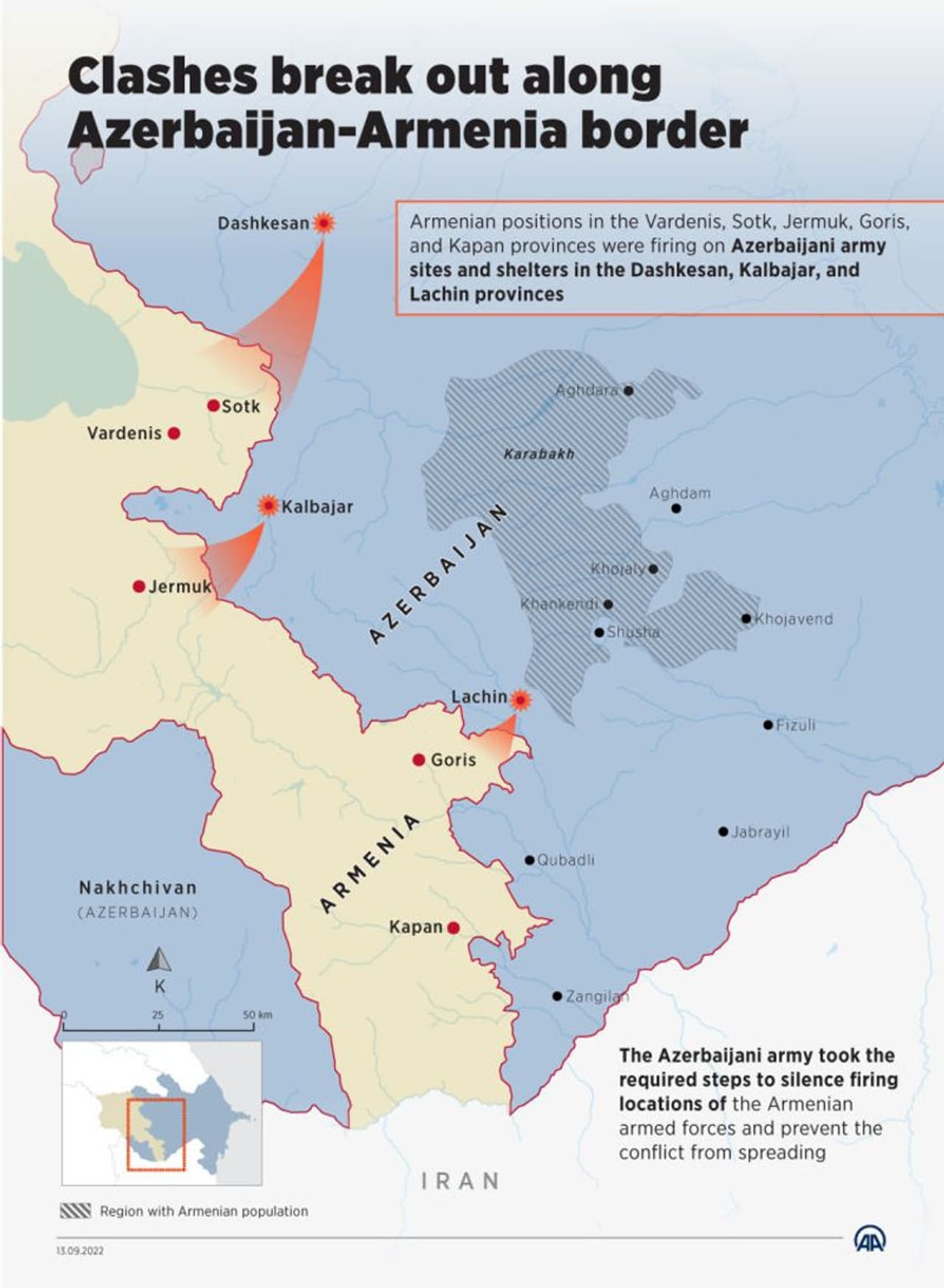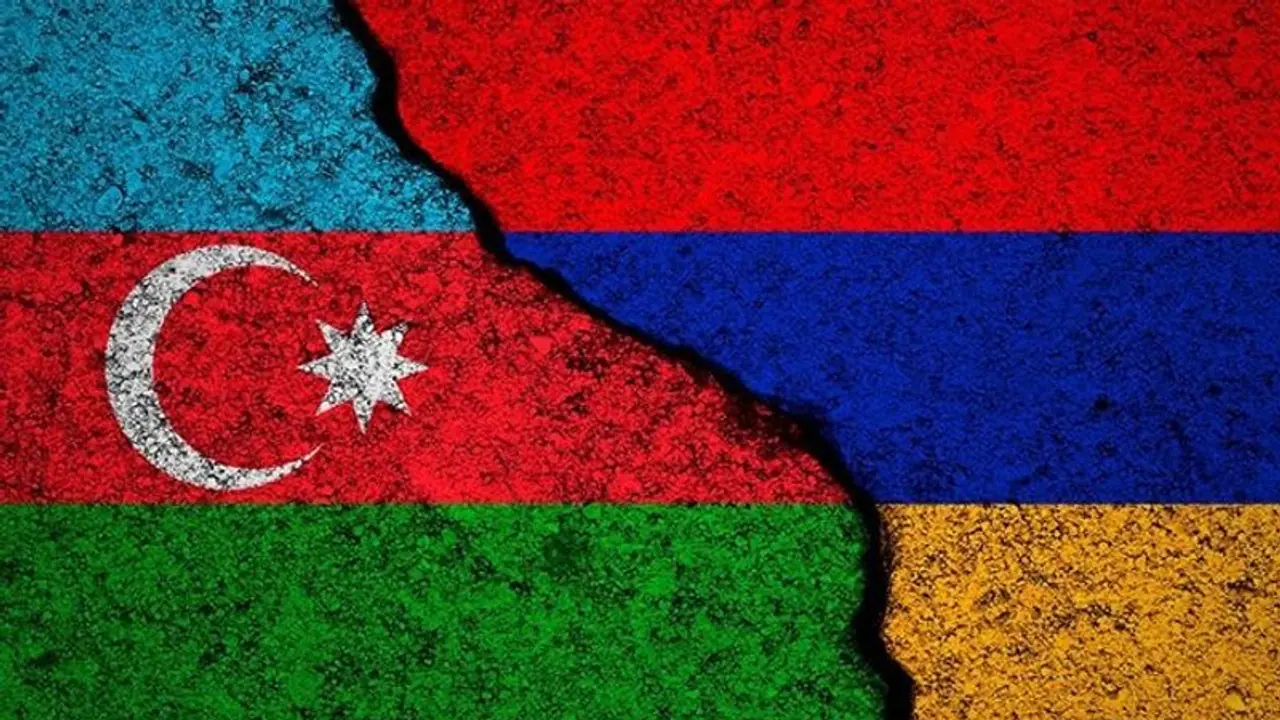Clashes erupted between Azerbaijani and Armenian troops on Tuesday, in a resumption of decades-old hostilities linked to the disputed territory of Nagorno-Karabakh.
For decades, there has been tension between Armenia and Azerbaijan over the disputed province of Nagorno-Karabakh. The two sides engaged in a brutal territorial conflict in 2020, which a truce mediated by Russia resolved.

What transpired on the night of September 13, 2022
On Tuesday, tensions flared again in the mountainous enclave inside Azerbaijan but controlled by ethnic Armenian separatists. Armenia's PM Nikol Pashinyan claimed 49 soldiers were killed in the night-time attacks by Azerbaijan, in the worst clashes since the hostile enemies were embroiled two years ago.
Armenia claimed that Azerbaijan troops "launched intensive shelling, with artillery and large-calibre firearms, against Armenian military positions in the direction of the cities of Goris, Sotk, and Jermuk" shortly after midnight.
In response, Azerbaijan's defence ministry accused Armenia of "large-scale subversive acts" near the districts of Dashkesan, Kelbajar and Lachin on the border, adding that its army positions "came under fire, including from trench mortars".

"Armenia has been shelling Azerbaijani military positions for a few weeks now. That shelling has been intensified over the last few days. Armenia has started amassing heavy weaponry and armaments along the deemed border between Armenia and Azerbaijan. What happened overnight is a large-scale provocation by Armenian military against Azerbaijani positions as well as the shelling of employee and civilian infrastructure," said Elnur Mammadov, Azerbaijan's deputy foreign minister.
Armenia made a plea for assistance to international leaders after several hours of severe border fighting, claiming Azerbaijani soldiers were attempting to push on its territory.
Has a ceasefire been reached?
Russia, Armenia's closest ally, claimed to have persuaded the two longtime foes to agree to a quick ceasefire. "We expect that an agreement reached as a result of Russian mediation on a ceasefire… will be carried out in full," the Russian foreign ministry said in a statement.

(Azerbaijani President Ilham Aliyev meets with commanders of Azerbaijani Armed Forces after tension rise at the border with Armenian in Baku, Azerbaijan on September 13, 2022.)
Here is all you need to know about the Nagorno-Karabakh conflict, which has been going on for the longest time in the post-Soviet region.
What are the roots of the conflict?
In the 1920s, the Soviet government originally formed the autonomous territory of Nagorno-Karabakh in Azerbaijan, where at least 95% of the populace is of Armenian ancestry.
However, it wasn't until 1988, when Moscow's hold on the country started to loosen, that the enclave became a flashpoint for the Soviet Union. The government of Nagorno-Karabakh declared independence from Azerbaijan, another Soviet republic, and sought rapprochement with the former Soviet republic of Armenia.
The two new countries engaged in a full-scale war for control of the area in 1992, following the fall of the Soviet Union. Although Nagorno-Karabakh lies inside Azerbaijan's internationally recognised borders, it is governed mainly by political groups with ties to Armenia.

Before a ceasefire was proclaimed in 1994, the violence claimed the lives of 20,000 and 30,000 people, and hundreds of thousands were displaced. According to the Council on Foreign Relations, Armenia not only came to rule Nagorno-Karabakh but also occupied 20% of the nearby Azerbaijani land.
What happened in 2020?
Frequent border confrontations broke out between 1994 and 2020, involving deploying attack drones, powerful weapons, and special operations on the front lines. In 2016, highly violent battles in Nagorno-Karabakh raged for four days between Azerbaijani and Armenian-backed forces.
However, Azerbaijan launched an offensive over the line of contact, held by Armenian forces and local fighters, in 2020, and a full-scale war ensued. The conflict that got underway on September 27 lasted for six weeks.

Azerbaijan received significant military assistance from Turkey, a regional power, throughout the conflict. According to reports, Turkey's military exports to Azerbaijan increased sixfold in the months before the start of the conflict. Experts believe that the sales of drones and other military hardware helped Azerbaijan turn the tide.
Also read: Armenia, Azerbaijan and Russia reach deal to end Nagorno-Karabakh War
Armenia had to relinquish portions of the area it had long held as part of the ceasefire negotiated by Russia. Russian peacekeepers were sent to the area to patrol after, according to the International Crisis Group, more than 7,000 combatants were killed.
How the world reacted to Tuesday's fresh clashes and what is India's stand?
India stated that the ongoing dispute should be settled through diplomacy and dialogue. "We have seen reports of attacks along the Armenia- Azerbaijan border, including targeting of civilian settlements and infrastructure on 12/13 September 2022. We call upon the aggressor side to immediately cease hostilities," said Arindam Bagchi, Official Spokesperson of Ministry of External Affairs.
"We believe that bilateral disputes should be settled through diplomacy and dialogue. There can be no military solution to any conflict. We encourage both sides to pursue talks to arrive at a lasting and peaceful solution," he added.

Meanwhile, Azerbaijan's close friend Turkey urged Yerevan to "cease its provocations" against Baku. Turkey Foreign Minister Mevlut Cavusoglu wrote on Twitter, "Discussed Armenian provocations on the Azerbaijan-Armenia state border w/ my brother Foreign Minister @bayramov_jeyhun of Azerbaijan. Armenia should cease its provocations & focus on peace negotiations and cooperation w/ Azerbaijan."
US Secretary of State Antony Blinken stated Washington was deeply concerned about reports of the attacks, and urged "an end to any military hostilities immediately", adding that "there can be no military solution to the conflict".
Charles Michel, the President of the European Council, stated that the bloc was "ready to make efforts to prevent further escalation", adding there was "no alternative to peace and stability in the region".
